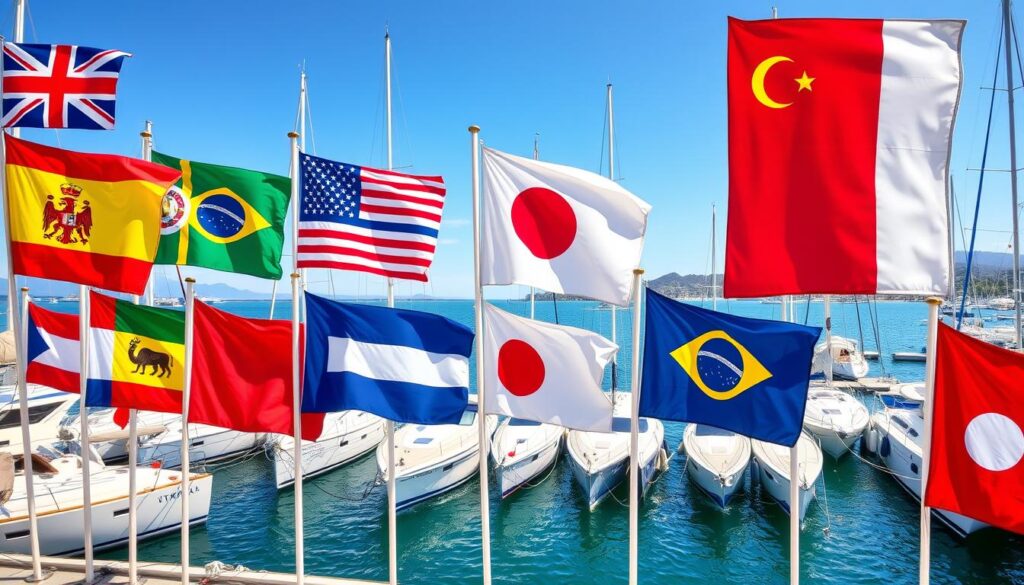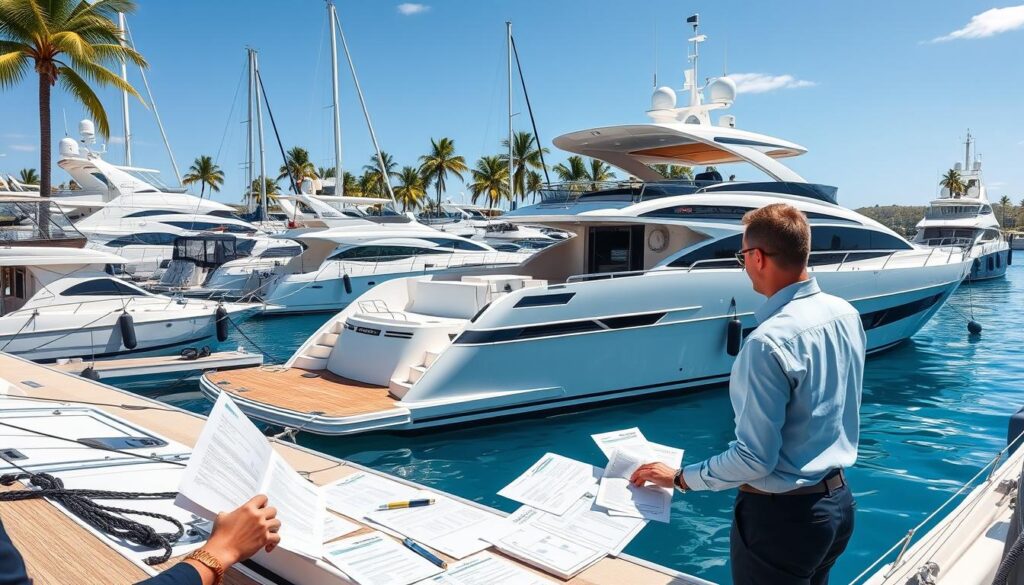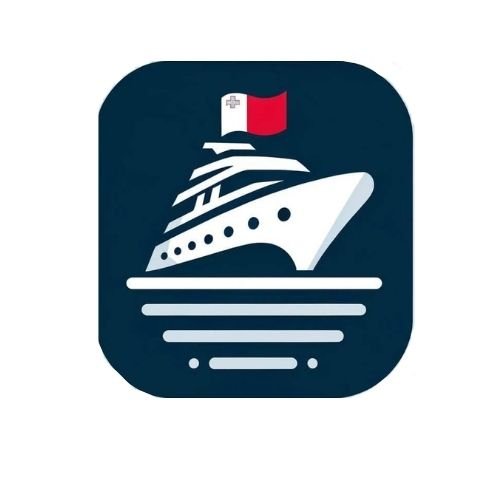Finding the right place to register your yacht can be tough. It affects your yacht’s legal status, taxes, and how well it runs. Places like the Cayman Islands and Malta offer great options, each with its own benefits.
This guide will cover everything you need to know about yacht registration, from financial perks to essential legal protections. We’ll explore the top destinations for yacht owners looking to rent out their yachts, highlighting what makes each location unique. Plus, we’ll break down the costs to help you make the best choice.
Key Takeaways
- Understand the critical requirements and legal documentation needed for yacht registration
- Explore the financial benefits and tax advantages of properly registering your yacht
- Discover the best global destinations for yacht registration, including their unique advantages
- Compare registration costs across different jurisdictions to find the most cost-effective option
- Familiarize yourself with the various flag states and their distinct benefits for yacht owners
Understanding Yacht Registration: Core Requirements and Benefits
Yacht registration is key in maritime law and yacht ownership. It makes sure owners follow international rules. It also protects their rights and offers financial perks. Let’s look at what’s needed and the benefits of proper registration.
Legal Documentation Requirements
To register a yacht, owners need to give many legal documents. These include proof of ownership, details about the yacht, and safety standards. This makes sure the yacht is legal and follows maritime laws. It gives owners the right to use their yacht.
Financial Benefits of Proper Registration
Yacht registration also has financial pluses. Registered yachts get tax breaks, no duty on imports and exports, and better insurance deals. These can lower the costs of owning and keeping a yacht.
Protection Under Maritime Law
Registering your yacht properly protects it and its owners. It gives legal help in disputes, accidents, or other sea issues. Registered yachts also get respect for following global rules.
Handling yacht registration can be tough. But knowing the basics is key for good yacht ownership. With the right paperwork, owners get peace of mind, money savings, and legal safety.
Best Place for Yacht Registration: Top Global Destinations
Choosing the right flag state for your yacht is key. It affects legal protections, financial benefits, and maritime operations. Several top destinations stand out for yacht owners looking for a strong registry.
Malta, the Cayman Islands, Marshall Islands, and Panama are leaders in yacht registration. They offer great tax benefits and legal support for the yachting world.
Stable politics, quick admin, and following global maritime rules are important. Knowing what each place offers helps yacht owners make the best choice for their needs.
“Choosing the right flag state for your yacht is a strategic decision that can have far-reaching implications for your maritime operations and overall business success.”
We’ll explore the benefits of each top destination for yacht registration. This guide will help you understand the complex choices involved.
Malta: The Premier Choice for Yacht Registration
Malta is a top pick for yacht registration in the EU. It has a strong legal setup, good tax deals, and EU benefits. These make it a great choice for yacht owners and operators.
Robust Legal Framework
Malta’s laws are stable and follow international maritime rules. Its maritime laws protect yacht owners well. This makes Malta a trusted yacht registry.
Tax Advantages in Malta
Malta’s taxes are good for yacht owners. The corporate tax rate is 35%, but there are tax breaks. Plus, Malta’s in the EU VAT system, making taxes easy in Europe.
EU Membership Benefits
Being in the EU helps Malta’s yacht owners a lot. They get to use the EU flag for sailing in the Mediterranean yachting area and more.
Malta’s strong laws, tax benefits, and EU membership make it the top Malta yacht registry choice worldwide.
“Malta has proven to be the perfect destination for yacht registration, offering the security and stability we were seeking for our fleet.”
– John Doe, CEO of Global Yachting Solutions
Comparing Registration Costs Across Different Jurisdictions
Yacht registration costs change a lot in different places. It’s key for yacht owners to know these costs. This helps them choose the best place to register their boats.
Initial Registration Fees
Yacht registration fees start at a few hundred dollars. They can go up to thousands, depending on where you register. Places like the Cayman Islands and Malta have lower fees. This makes them popular for yacht owners.
Annual Renewal Costs
Yacht owners also face annual renewal fees. These fees can change a lot. Some places charge a flat rate, others by the size or value of the yacht. It’s important to compare these costs to find the best deal.
Other Associated Costs
- Ongoing safety inspections and certifications
- Legal and administrative fees
- Potential tax implications and compliance requirements
Other yacht registration fees add up. They affect the total cost of owning a yacht. Owners should think about all costs when picking a flag state.
“The key to making a smart decision on yacht registration is to thoroughly analyze the costs and benefits of each jurisdiction, ensuring long-term financial sustainability.”
Knowing how to compare flag states helps owners make a smart choice. This choice should fit their budget and long-term plans.

Popular Flag States and Their Unique Advantages
Some flag states are more popular for yacht registration. The Cayman Islands, Marshall Islands, and Panama are top choices. Each offers special benefits that make them great for registering your yacht.
Cayman Islands Registration Benefits
The Cayman Islands is a favorite for yacht registration. It has a strong legal system and is tax-friendly. As an offshore registry, it gives yacht owners flexibility and privacy. It also has a great maritime infrastructure and is known for excellence.
Marshall Islands Advantages
The Marshall Islands flag is popular for yacht owners. It’s known for a quick registration process and strict maritime rules. It’s a safe and respected registry, thanks to its stable politics and global standards.
Panama Flag Benefits
Panama is great for those wanting an offshore registry. The Panama maritime authority has a well-liked and efficient registration system. It offers tax breaks, easy admin, and a strong maritime reputation.
Choosing the Cayman Islands, Marshall Islands, or Panama has its perks. Each flag state has unique benefits for yacht owners. By looking at their laws, taxes, and industry standing, you can pick the best for your yacht.
Registration Process and Timeline Expectations
Getting through yacht documentation and maritime paperwork can be tough. But knowing the steps for vessel registration makes it easier. The time it takes can change based on the flag state. Still, a clear plan can help avoid delays and speed things up.
First, yacht owners must collect the needed yacht documentation and maritime paperwork. This includes proof of ownership, details about the vessel, and ID documents. Some flag states might ask for more, like inspections or crew checks.
- Gather all required yacht documentation and maritime paperwork.
- Submit the completed application and supporting documents to the chosen flag state.
- Undergo any necessary inspections or surveys to ensure the vessel meets safety and compliance standards.
- Wait for the flag state to process the application and issue the official vessel registration.
The vessel registration time frame can vary. Usually, it’s 2-4 weeks for a simple case. But, busy seasons, missing documents, or extra needs can slow it down. Knowing these things helps owners plan better and set realistic goals.
“Proper yacht documentation and a smooth registration process are essential for ensuring compliance and accessing the full benefits of maritime law.”
By learning about the yacht documentation and maritime paperwork needs, and the usual vessel registration time, owners can feel more confident. They can make sure their yacht is registered right and well-protected.

Commercial vs. Private Yacht Registration: Key Differences
Choosing between commercial and private yacht registration matters a lot. It’s important to know the rules for each to follow the law and use your yacht well.
Commercial Registration Requirements
Commercial yachts need to follow strict rules. They must pass safety checks, get regular inspections, and have the right insurance. Owners also need licenses and permits to rent out their yachts legally.
Private Vessel Considerations
Private vessels have it easier. They need less paperwork but still must be documented and insured. Owners should also know they can’t use their yachts for commercial activities like charters.
Deciding between commercial and private registration depends on how you plan to use your yacht. Think carefully about the rules and benefits for each option. This ensures you follow the law and use your yacht as you wish.
Crew Requirements and Certification Standards
Yacht registration needs a safe and compliant crew. Each place has its own rules for crew training and qualifications. These rules help keep everyone safe at sea.
Maritime crew certification is key for yacht jobs. Captains, engineers, and deck hands need special certifications. These meet international and local laws.
- Captains need a yacht master certification or similar. It shows they know how to navigate, handle emergencies, and manage the yacht.
- Engineers must have seafarer qualifications for the yacht’s engines and upkeep.
- Deck hands go through yacht staffing training. It covers safety, guest service, and sailing skills.
The minimum crew size is also important. The size of the yacht and its use decide how many crew are needed. This ensures safety and proper operation.
“Maintaining a well-trained and certified crew is paramount for the successful and compliant operation of any registered yacht.”
Following maritime crew certification rules and crew size guidelines is crucial. It makes sure the yacht has a skilled team. This keeps everyone safe and follows the law.
Tax Implications and Financial Planning for Yacht Owners
As a yacht owner, knowing about taxes and money matters is key. This includes yacht taxes, maritime insurance, and upkeep costs. It’s important to plan well to avoid surprises.
VAT Considerations
The value-added tax (VAT) can greatly affect your yacht’s cost. The VAT rate changes based on where your yacht is registered. Make sure to check the VAT rules in your chosen registry to avoid extra costs.
Annual Maintenance Costs
Yacht ownership is more than just buying a boat. You’ll need to pay for upkeep, like crew salaries and fuel. It’s important to plan and budget for these costs to keep your yacht in good shape.
Insurance Requirements
Yacht owners need the right insurance. This includes coverage for the boat and liability insurance. Understanding your insurance options is crucial. With the right advice, you can manage your yacht’s finances and follow the law.
By thinking about taxes, budgeting for upkeep, and getting the right insurance, you can enjoy your yacht. This way, your sailing will be smooth and worry-free.
Legal Compliance and Maritime Regulations
Yacht owners must understand maritime law compliance. Following international maritime rules is a must. It keeps your vessel and crew safe.
The International Maritime Organization (IMO) sets global maritime standards. Yacht owners need to know these rules. They cover yacht safety regulations, pollution, and crew training.
Following maritime law compliance is key. This means following rules like MARPOL and SOLAS. Your yacht must meet these strict standards to stay safe and protect the environment.
- Regular safety checks and upkeep are crucial for following maritime rules.
- It’s important to train and certify your crew properly.
- Keep your yacht’s documents, like registration and certificates, current and ready.
Following maritime law compliance is a big responsibility. It keeps your crew safe, protects the sea, and avoids legal trouble.
“Embracing maritime regulations is not a burden but a commitment to responsible and secure yachting.”
When you own a yacht, following the law is very important. It lets you enjoy the sea while keeping everyone safe and the environment clean.
Conclusion: Choosing the Right Yacht Registry for Your Needs
When you’re looking into yacht registration, it’s important to think about a few key things. These include legal, financial, and practical aspects. The right maritime jurisdiction can greatly affect your yacht’s operation, taxes, and safety.
Malta is a top choice for yacht registration. It has a strong legal system, good tax deals, and benefits from being in the European Union. Knowing what each flag state offers helps you choose the best one for you.
Whether your yacht is for business or pleasure, knowing what to look for is crucial. Seek advice from experts and focus on what’s most important to you. This way, your yacht will be registered in a way that meets your needs best.
